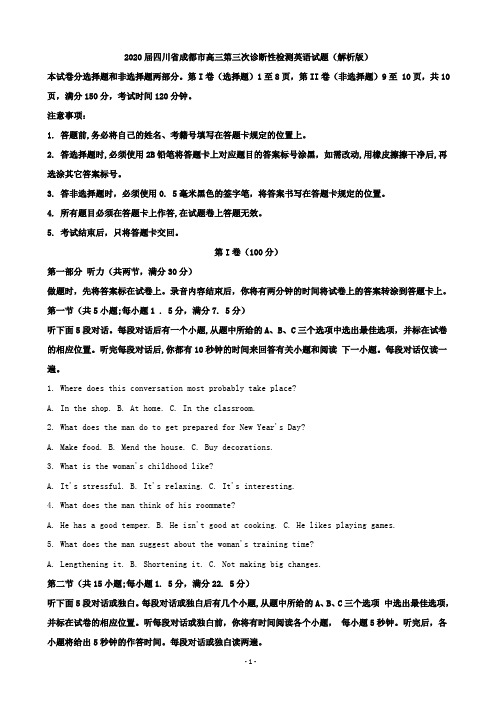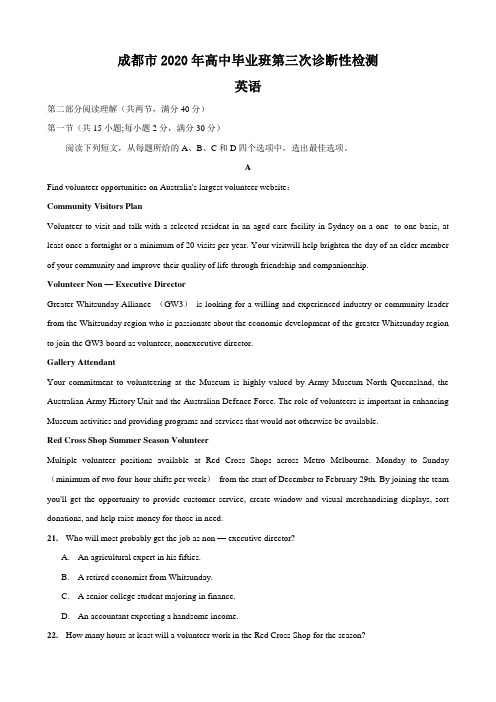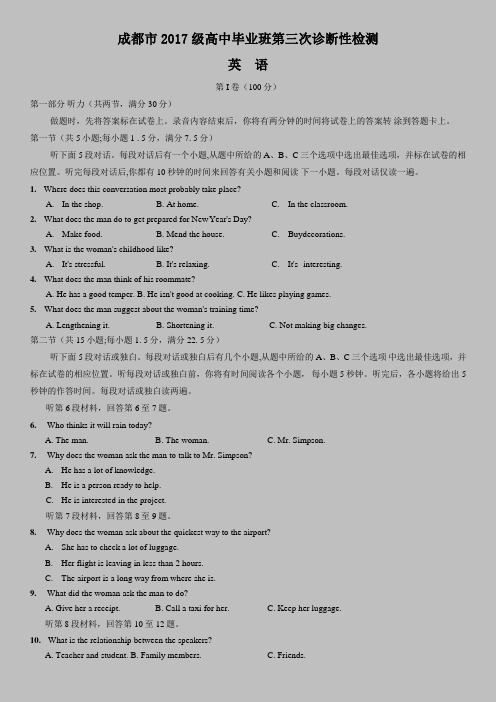成都市2017级高中毕业班第三次诊断考性检测 英语试题 2020成都三诊英语
2020年四川省成都市高三第三次诊断性考试英语试题-含答案

`5D F<??B2326>596<B?2G53D6<9A7128;61 32A<67237<4C<9AD> 612?:26;94 12?><9A8D675E236 G<94 F1;7712C;32?55=<9AG53*
a #"""" >23C2;3 ->>?C75W591=2<36^7:1567*85E
6)47),8),+%44'45)95 02;32?55=<9AG538;6D;?72;EE2EB23675b5<9 5D372;EG53$" Z+" 15D36>23F22= `5D ED671;:2;>56<7<:2;77<7D42;94 A32;7F<??<9A9266757;?= 755712368;9 F53= <9 B571 ;
听第 L 段材料回答第 $$ 至 $+ 题
$$*01C4526712E;9 ;4:<62G?C<9A5D7<9 712E539<9A
-*@76;:26712EE5327<E2* .*@785676712E?266E592C* /*@7E;=26712EE53232?;V24*
$!*O5F4<4 712F5E;9 A2775712;<3>537?;67C2;3
.*O245269I7?<=27128;37559*
2020届四川省成都市高三第三次诊断性检测英语试题(解析版)

2020届四川省成都市高三第三次诊断性检测英语试题(解析版)本试卷分选择题和非选择题两部分。
第I卷(选择题)1至8页,第II卷(非选择题)9至 10页,共10页,满分150分,考试时间120分钟。
注意事项:1. 答题前,务必将自己的姓名、考籍号填写在答题卡规定的位置上。
2. 答选择题时,必须使用2B铅笔将答题卡上对应题目的答案标号涂黑,如需改动,用橡皮擦擦干净后,再选涂其它答案标号。
3. 答非选择题时,必须使用0. 5毫米黑色的签字笔,将答案书写在答题卡规定的位置。
4. 所有题目必须在答题卡上作答,在试题卷上答题无效。
5. 考试结束后,只将答题卡交回。
第I卷(100分)第一部分听力(共两节,满分30分)做题时,先将答案标在试卷上。
录音内容结束后,你将有两分钟的时间将试卷上的答案转涂到答题卡上。
第一节(共5小题;每小题1 . 5分,满分7. 5分)听下面5段对话。
每段对话后有一个小题,从题中所给的A、B、C三个选项中选出最佳选项,并标在试卷的相应位置。
听完每段对话后,你都有10秒钟的时间来回答有关小题和阅读下一小题。
每段对话仅读一遍。
1. Where does this conversation most probably take place?A. In the shop.B. At home.C. In the classroom.2. What does the man do to get prepared for New Year's Day?A. Make food.B. Mend the house.C. Buy decorations.3. What is the woman's childhood like?A. It's stressful.B. It's relaxing.C. It's interesting.4. What does the man think of his roommate?A. He has a good temper.B. He isn't good at cooking.C. He likes playing games.5. What does the man suggest about the woman's training time?A. Lengthening it.B. Shortening it.C. Not making big changes.第二节(共15小题;每小题1. 5分,满分22. 5分)听下面5段对话或独白。
高2020届成都三诊英语书面表达范文

成都市2017级高中毕业班第三次诊断性检测英语书面表达范文第二节书面表达(满分25分)但定你是李华,你之前在网上为你校交换生Jack预定了下周六晚上7 : 30的川剧演出,现该演出被宣布取消,请给他写一封邮件,内容要点如下:1. 告知演出取消:2.后续事项处理: 3, 其它活动建议。
注意; 1,间数100左有: 2,可适当增加细节,以使行文连贯。
Dear Jack,_____________________________________________________________________ _____________________________________________________________________ _____________________________________________________________________Yours,Li HuaDear Jack,How’s everything going?As you know, a Si Chuan Opera performance, intended to be held in the theater at 7:30 p.m. next Saturday , has attracted lots of fans. I booked a ticket online for you as soon as possible. Unfortunately, it’s declared that the performance will be canceled because some actors can’t be present. What a pity!In order to compensate audiences like you , the theater will not only return money to the relevant bank accounts but also send a letter of apology with a famous actor’s autograph to your E-mail box.Next Saturday evening, I will go to the cinema with my friends. A popular filmnamedThe Captain, which is based on the true story of a heroic pilot in Si Chuan, will ,be shown. Would you like to join us?Looking forward to your reply.Yours.Li Hua如有侵权请联系告知删除,感谢你们的配合!。
四川省成都市2020届高三第三次诊断性检测英语试题含答案

成都市2017级高中毕业班第三次诊断性检测英语本试卷分选择题和非选择题两部分。
第I卷(选择题)1至8页,第II卷(非选择题)9至10页,共10页,满分150分,考试时间120分钟。
注意事项:1.答题前,务必将自己的姓名、考籍号填写在答题卡规定的位置上。
2.答选择题时,必须使用2B铅笔将答题卡上对应题目的答案标号涂黑,如需改动,用橡皮擦擦干净后,再选涂其它答案标号。
3.答非选择题时,必须使用0.5毫米黑色的签字笔,将答案书写在答题卡规定的位置。
4.所有题目必须在答题卡上作答,在试题卷上答题无效。
5.考试结束后,只将答题卡交回。
第I卷(100分)第一部分听力(共两节,满分30分)做题时,先将答案标在试卷上。
录音内容结束后,你将有两分钟的时间将试卷上的答案转涂到答题卡上。
第一节(共5小题;每小题1.5分,满分7.5分)听下面5段对话。
每段对话后有一个小题,从题中所给的A、B、C三个选项中选出最佳选项,并标在试卷的相应位置。
听完每段对话后,你都有10秒钟的时间来回答有关小题和阅读下一小题。
每段对话仅读一遍。
1.Where does this conversation most probably take place?A.In the shop.B.At home.C.In the classroom.2.What does the man do to get prepared for New Year's Day?A.Make food.B.Mend the house.C.Buydecorations.3.What is the woman's childhood like?A.It's stressful.B.It's relaxing.C.It's interesting.4.What does the man think of his roommate?A.He has a good temper.B.He isn't good at cooking.C.He likes playing games.5.What does the man suggest about the woman's training time?A.Lengthening it.B.Shortening it.C.Not making big changes.第二节(共15小题;每小题1.5分,满分22.5分)听下面5段对话或独白。
2020年高考_成都市2017级高中毕业班第三次诊断性检测英语试题(含答案和解析)

英语“三诊”考试题第1页(共10页) 成都市2017级高中毕业班第三次诊断性检测本试卷分选择題和非选择题两部分。
第T 卷(选择题)1至8页,第[!卷(非选择题)9至 10页•共10页席分150分•考试时间120分钟。
注意事项:L 答题前•务必将自己的姓名■考籍号填写在答题卡规定的位置上•2.答选择題时,必须便用2B 铅笔将答题卡上对应题目的答案标号涂黑,如需改动,用橡 皮擦擦干净后•再选涂其它答案标号C4.所冇题目必须在答题卡上作答,在试题卷上答题无效•5∙考试结束后,只将答題卡交回•第I 卷(IOO 分)第一部分听力(共两节,満分30分〉做题时,先将答案标在试卷上。
录音内容结束后,你将有两分钟的时间将试卷上的答案转 涂到答题卡上.第一节(共5小題海小题1 • 5分,满分7. 5分〉听下面5段对话。
毎段对话后有一个小題,从题中所给的A.B∙C 三个选项中选出最佳选 项■并标在试卷的相应位登.听完每段对话后,你都有10秒钟的时间来冋答有关小题和阅读 下一小题•每段对话仅读一遍•1∙ Where does this COnVerSatiOn most PrObabIy take place?A. In tbc shop.B. At home. C In the CIaSSrOOτn∙2A What does the man do lo get PreParecl for NeW Year's Day?3∙ What is the woman's ChIIdhOOd like? A e It ?s StreSSfUL B. relaxing.4. What does the Inan think of his r∞mmate?A e He has a good temper a R He isn't good at Cookirι⅛ 5. What does the man SUggeSt abOUt the woman's IrainiRg time?A- Lengthening it∙ B. ShOrtenLng it C. Not Tnaking big change% 第二节(共15小题侮小题1.5分,满分22. 5分〉听下面5段对话或独白。
成都市2020年高中毕业班第三次诊断性检测英语试题及答案

成都市2020年高中毕业班第三次诊断性检测英语第二部分阅读理解(共两节,满分40分)第一节(共15小题;每小题2分,满分30分)阅读下列短文,从每题所给的A、B、C和D四个选项中,选出最佳选项。
AFind volunteer opportunities on Australia's largest volunteer website:Community Visitors PlanVolunteer to visit and talk with a selected resident in an aged care facility in Sydney on a one- to-one basis, at least once a fortnight or a minimum of 20 visits per year. Your visitwill help brighten the day of an elder member of your community and improve their quality of life through friendship and companionship.Volunteer Non — Executive DirectorGreater Whitsunday Alliance (GW3)is looking for a willing and experienced industry or community leader from the Whitsunday region who is passionate about the economic development of the greater Whitsunday region to join the GW3 board as volunteer, nonexecutive director.Gallery AttendantYour commitment to volunteering at the Museum is highly valued by Army Museum North Queensland, the Australian Army History Unit and the Australian Defence Force. The role of volunteers is important in enhancing Museum activities and providing programs and services that would not otherwise be available.Red Cross Shop Summer Season VolunteerMultiple volunteer positions available at Red Cross Shops across Metro Melbourne. Monday to Sunday (minimum of two four-hour shifts per week)from the start of December to February 29th. By joining the team you'll get the opportunity to provide customer service, create window and visual merchandising displays, sort donations, and help raise money for those in need.21. Who will most probably get the job as non — executive director?A. An agricultural expert in his fifties.B. A retired economist from Whitsunday.C. A senior college student majoring in finance.D. An accountant expecting a handsome income.22. How many hours at least will a volunteer work in the Red Cross Shop for the season?A.48.B. 52.C. 104.D. 144.23. Which one might interest a military fan most?A. Gallery Attendant.B. Community Visitors Plan.C. Volunteer Non — Executive Director.D. Red Cross Shop Summer Season Volunteer.B"Like a monster, it destroys everything. " That's how one school girl described a tsunami(海啸).On Dec. 26, 2004, a magnitude-9. 1 earthquake in Indonesia set off a massive tsunami. It killed more than 230,000 people across four countries and cost an estimated $ 10 billion in damage.Nov. 5 is World Tsunami Awareness Day and at the United Nations Wednesday, disaster risk reduction was high on the agenda."What I can tell you is that the tsunami wave cannot be stopped," said Bulgarians U. N. Ambassador Georgi Velikov Panayotov. He was on vacation in Thailand in 2004 and survived the tsunami. "What we can do is build early warning systems and, of course, educate the population about the damaging power of the tsunami wave," he said.On March 11, 2011, a magnitude-9 earthquake rocked northeastern Japan triggering a fierce tsunami that also damaged the Fukushima Daiichi nuclear plant, south of Sendai."When the big earthquake hit Japan in 2011, people thought that we were prepared for it," said Japan's U. N. Ambassador Koro Bessho. "It caused severe damage. We had dams;we had drills. However, we had been counting on something that hits every 100 years and the earthquake was of the size of possibly every 500 years or thousand years,he said.These two events sent the countries of the region into overdrive to review and improve disaster preparedness. In 2015 the Sendai Framework for Disaster Risk Reduction was born. It aims to help create a better understanding of disaster risk and improve preparedness for an effective response.Indonesia is made up of thousands of islands which are disaster-prone(易受灾地区). Willem Rampangilei, head of the Disaster Management Agency of Indonesia, said his government now has plans for everydisaster-prone city.Countries at risk are also expanding their education programs. Children from an early age are taught how to react in case of a tsunami and then go with their classmates to higher ground away from coastal areas to avoid the walls of water the tsunami triggers.24. What does Georgi Velikov Panayotov mainly talk about?A.The general features of a tsunami.B. Ways for humans to face a tsunami.C. His suffering in the 2004 tsunami.D. The loss caused by the 2004 tsunami.25. In Koro Bessho's opinion, why did the 2011 earthquake cause severe damage?A. It caused a fierce tsunami.B. It destroyed a nuclear plant.C. The size was beyond expectation.D. There was no effective defense system.26. What common belief pushed different countries to take action to face a coming tsunami?A. Children should be protected by all means.B. The improvement of preparedness can reduce damage.C. Proper response in case of a tsunami can save one's life.D. Stronger measures should be taken in disaster-prone areas.27. Which can be the best title of the text?A. World Tsunami Awareness DayB. Nations Attacked by Massive TsunamiC. The Unpredictable and Destructive DisasterD. Learn from Disasters to Prevent Future OnesCArcheology (考古学)isn't the dusty science it was a generation ago. New technologies that once seemed out of sci-fi are now locating buried traces of buildings and revealing the ruins of cities.For more than a decade, Sarah Parcak and her team have been on the front line of this revolution. They use satellite images to find and explore ancient sites around the globe. Now they're about to take on a new challenge as they focus Global Xplorer citizen-science project on India.In 2017, Parcak launched an online platform, called Global Xplorer, to crowd source (群众外包)the initial assessment of satellite images for signs of cultures from long ago. Anyone in the world with a computer and Internet access could help discover and protect remains of Peru's rich cultural heritage. The results have been surprising. About 80,000 participants from a hundred countries have identified 19,000 sites that were not in Peru's database. The platform for Peru is still running.If all goes well, the work in India could last for years. "India has had relatively little archaeological work done," Parcak says. Also, the full extent of India's archaeological work has never been mapped completely. Parcak expects her project to make up that. “Wherever we end up going, the crowd's going to be able to see extraordinary things," Parcak says.Thirty six India's cultural heritage relics are already listed as UNESCO World Heritage Sites. Parcak thinks there could be tens of thousands of as yet unknown sites mapped as part of this project. The discoveries promise to be amazing across the land that has seen a parade of cultures come and go.In the future, she hopes other countries will contact her to launch their own satellite surveys. The possibilities are huge. Parcak estimates that there are at least 12 million potential archaeological sites yet to be discovered. That means the sky is the limit for her project now that it has gotten off the ground successfully.28.What's the purpose of Parcak's project?A. To interview citizens via the Internet.B. To dig out more remains of ancient cities.C. To build databases for unknown cultural heritage.D. To identify unknown ancient sites through joint efforts.29.What do we know about the participants in Peru project?A. They are Internet-equipped volunteers.B. They are well-trained voluntary scholars.C. They are mostly fans of archeology in Peru.D. They are all archaeologists all over the world.30. Why is Parcak's project important to India?A. India lacks thorough archaeological work.B. Indians call for the protection of their rich cultures.C. There's no amazing archaeological discovery in India.D. India needs more relics listed as World Heritage Sites.31. What does the underlined sentence "The possibilities are huge. " in Paragraph 6 mean?A. Parcak's project will become successful.B. Few countries will start satellite surveys.C. There will be amazing discoveries in India.D. More archaeological sites will be identified.DOver 2. 5 quintillion (1018)bytes of data are created each day. Many of them consist of information that would allow people to be personally identified.At the same time that we share our personal information, there is a growing concern with how thatinformation is being gathered, stored, used and shared. While many economies like Canada and the EU have privacy laws dating back to the mid-1990s, changes to data practices in the past five years have motivated governments to review or update existing laws.Changes to privacy laws are being fuelled by growing public concerns with the idea of unrestricted data accumulation and use. For instance, earlier this year, the World Economic Forum found that 1/3 of global citizens have no idea about how their personal information is used and that trust is lacking.Privacy laws are changing to deal with the real and noticed risks of harm which result from the under-regulated or unregulated data economy. The EU has introduced big reform to laws which are aimed at protecting privacy. The EU's General Data Protection Regulation (GDPR)introduced strict requirements for those that control or process the personal data of the people who live in the EU. The GDPR's stated goals focus on the protection and basic rights of personal information. Certain US states are also entering the ring in the fight for control over personal data. They have passed or are actively considering privacy laws. California is out front. The California Consumer Privacy Act(CCPA)provides greater control to individuals over their personal information. There is a sense that privacy laws are on the near horizon in the US.These are two examples that are actively pursuing more progressive privacy laws. One important consideration is to harmonize global standards for best law practices. This will ease compliance (遵守)across border and provide a valuable signal to the public that governments are keeping pace with rapid change.32. What's the cause of the change of privacy laws?A.A growing need for information.B. Public concerns over data security.C. General awareness of data control.D. Collection of personal information.33. How does Paragraph 4 develop?A.By giving examples.B. By listing statistics.C. By analyzing reasons.D. By making comparisons.34. What is an important consideration for global law makers?A. The practice of laws in different fields.B. The reflection of reality in different eras.C. The consistency of laws in different regions.D. The adaptation to changes in different societies.35. What is the passage mainly about?A. EU passes new laws for privacy protection.B. Governments ignore the violation of personal privacy.C. Privacy laws are changing to protect personal information.D. People lack the awareness of personal information protection.第二节(共5小题;每小题2分,满分10分)根据短文内容,从短文后的选项中选出能填入空白处的最佳选项,选项中有两项为多余选项。
【英语】2020届四川省成都市高中毕业班第三次诊断性检测

2020届四川省成都市高中毕业班第三次诊断性检测英语试题(考试时间120分钟,满分150分)第I卷(共115分)第一部分:听力(共两节,满分30分)做题时,先将答案划在试卷上。
录音内容结束后,你将有两分钟的时间将试卷上的答案转涂到答题卡上。
第一节(共5小题;每小题1.5分,满分7.5分)听下面5段对话。
每段对话后有一个小题,从题中所给的A、B、C三个选项中选出最佳选项,并标在答题卷的相应位置。
听完每段对话后,你都有10秒钟的时间来回答有关小题和阅读下一小题。
每段对话仅读一遍。
1.Where did the woman probably go?A.To the cinema. B.To the schoo1. C.To the park.2.How does the man feel about his driving to work?A.It takes him too much time.B.The distance is a little long.C.He feels satisfied with it.3.What do the girls have in common according to the dialogue?A.They like sports. B.They like shopping. C.They like soap operas. 4.How much wil1 the lady pay for the shirt if she buys one?A.180 dollars. B.200 dollars. C.220 dollars.5.What can we 1earn from the conversation?A.The man will probably take the sleeping pil1.B.The man didn’t sleep well 1ast week.C.The woman will buy some sleeping pills.第二节(共15小题;每题1.5分,满分22.5分)听下面5段对话或独白。
四川省成都市2020届高中毕业班第三次诊断性检测文科英语试题

成都市2017级高中毕业班第三次诊断性检测英语第I卷(100分)第一部分听力(共两节,满分30分)做题时,先将答案标在试卷上。
录音内容结束后,你将有两分钟的时间将试卷上的答案转涂到答题卡上。
第一节(共5小题;每小题1 . 5分,满分7. 5分)听下面5段对话。
每段对话后有一个小题,从题中所给的A、B、C三个选项中选出最佳选项,并标在试卷的相应位置。
听完每段对话后,你都有10秒钟的时间来回答有关小题和阅读下一小题。
每段对话仅读一遍。
1. Where does this conversation most probably take place?A. In the shop.B. At home.C. In the classroom.2. What does the man do to get prepared for New Year's Day?A. Make food.B. Mend the house.C. Buydecorations.3. What is the woman's childhood like?A. It's stressful.B. It's relaxing.C. It's interesting.4. What does the man think of his roommate?A. He has a good temper.B. He isn't good at cooking.C. He likes playing games.5. What does the man suggest about the woman's training time?A. Lengthening it.B. Shortening it.C. Not making big changes.第二节(共15小题;每小题1. 5分,满分22. 5分)听下面5段对话或独白。
